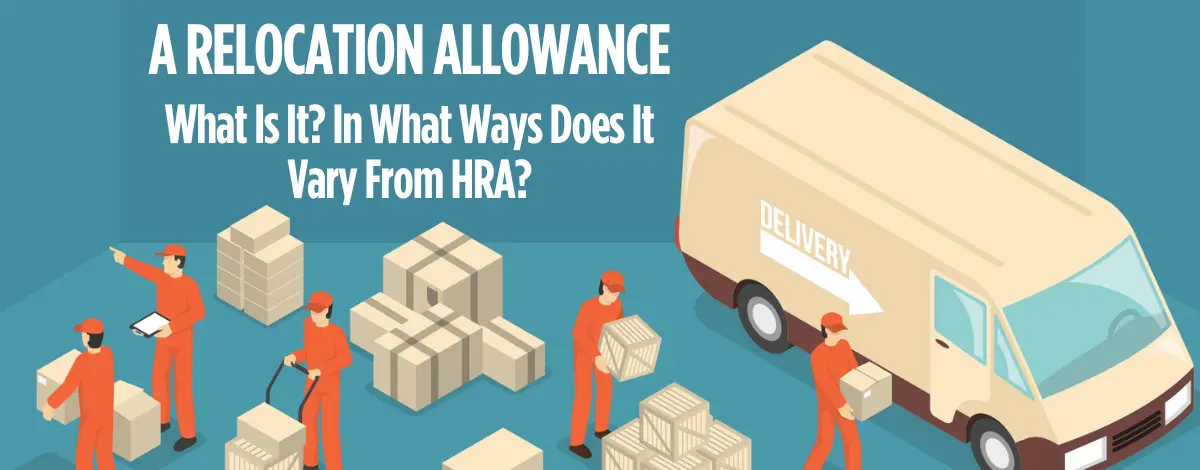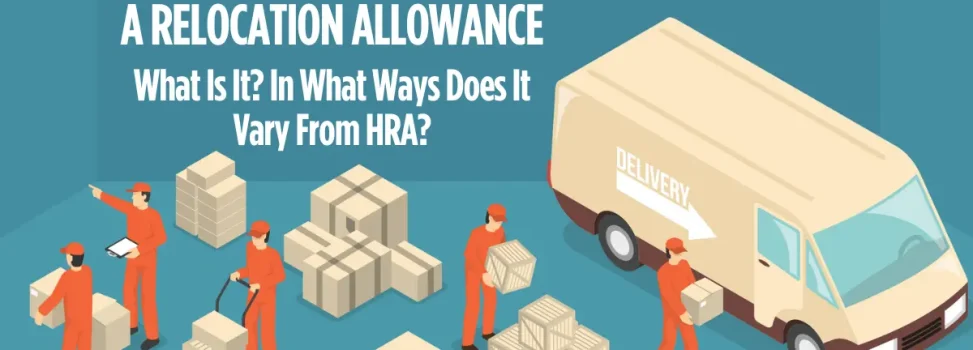When moving to India for work, you may be familiar with the terms of the House Rent Allowance (HRA) and Relocation Allowance. It could be challenging to comprehend the differences between the two and how they impact your taxes, though. Although the HRA portion of your pay is meant to cover any rental housing, relocation assistance is provided when you move completely. This post will define relocation allowances, discuss how they differ from HRAs, and discuss how they affect your taxes.
Relocation Allowance: What Is It?
An employer may give a relocation allowance, often called a transfer allowance, to a worker in order to help defray some of the costs associated with changing jobs. This category can contain a number of prices, including moving costs, lodging costs while temporarily located, and other related costs. This allowance is sometimes given in one lump payment or repaid when the employee submits receipts.
How can you get your Relocation Allowance Back?
To provide proof of expenses, you must maintain records of any pertinent documents, such as contracts and invoices, that your employer has approved. These documents function as confirmation of money received and proof of expenses incurred. These could cover the price of moving, lodging while temporary, and any other costs related to the move.
You can get a contract or agreement with your company outlining the conditions of the relocation allowance. The employer will document the costs associated with the relocation allowance compensation in their financial records as company costs.
Keep in mind that there will be taxes applied to any variance between the amount you actually paid for the move and the amounts compensated.
The Relocation Allowance’s tax advantages:
Your company will take into account the tax advantages when making relocation and reimbursement plans. This is to guarantee that these costs are eligible for reimbursement as company expenses.
Relocating can, in essence, provide a number of challenges, the majority of which are monetary. Therefore, in order to avoid misunderstanding regarding any potential tax ramifications, it is crucial that you comprehend the distinction between relocation allowance and HRA. Relocation allowances are single payments with tax advantages that are intended to help with moving expenditures. Conversely, HRA is a periodic payment given to an employee to assist with the expense of leasing a property.
So, you may stop stressing about the enormous moving costs and start making decisions about moving to land that dream career. Selecting packers and movers service from 1Support is one method to relieve some of the stresses associated with moving. Take advantage of a range of cost-effective house-moving packages that offer a comprehensive solution for smooth relocation.
Are Relocation Allowance and HRA Distinct?
Relocation Allowance and HRA are not the same thing:
For professional taxpayers, the House Rent Allowance (HRA) is a significant advantage. A portion of your wage package is an allowance from your employer that pays for rent. You may be able to deduct some tax from your HRA.
Relocating, in contrast, necessitates higher costs for things like moving residences, transferring commodities, locating new educational institutions, etc. The employee may receive a lump cash payment recognized as a relocation allowance or the organization can give back these costs to the employee. Various relocation expenses have varying tax implications.
Costs associated with packing, moving, and transit:
Whether moving and packing expenses are covered by employers outright or are repaid by employees, they are not subject to taxes. A large portion of a relocation allowance goes toward covering the cost of moving a car. They can grant tax exemption to gas and driver expenses incurred for employee-owned vehicles because they are private belongings.
Broker Expenses:
If the employer pays the amount back, the entire sum is taxable since it is seen as a component of the worker’s own duties. They may consider the first fifteen days, a hotel or other short-term lodging in the new city an exemption from paying taxes. It covers all basic costs, such as meals, accommodation, and boarding, that are paid for by an allowance or reimbursement. Any costs that are incurred after 15 days are deducted from the staff member’s salary and are subject to taxation.
The cost of your children’s school enrollment:
They deem employees to receive financial benefits when they reimburse their school admissions costs. It is therefore regarded as subject to taxation, and there is no tax relief. The amount of money you get reimbursed must be part of your taxable earnings.
The Train or Airline Tickets for Every Family Member:
It’s possible that you and your family will have to pay a lot of money for airline or train tickets. Payment for these costs is not subject to taxes.
To be eligible for Relocation Allowance advantages or tax compromises, you must present all of your employer’s contracts, invoices for payments, and records.
FAQs about Relocation Allowance and HRA:
An employer may give a relocation allowance, often called a transfer allowance, to a worker in order to help defray some of the costs associated with changing jobs. This category can contain a number of prices, including moving costs, lodging costs while temporarily located, and other related costs.
Yes, there are tax implications for the relocation allowance.
Any costs that are incurred after 15 days are deducted from the staff member’s salary and are subject to taxation.
To be eligible for Relocation Allowance advantages or tax compromises, you must present all of your employer’s contracts, invoices for payments, and records.


